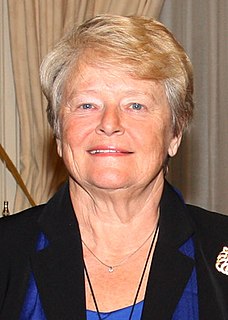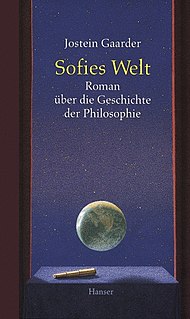Related Research Articles

Gro Harlem Brundtland is a Norwegian politician, who served three terms as Prime Minister of Norway and as Director-General of the World Health Organization from 1998 to 2003. She is also known for having chaired the Brundtland Commission which presented the Brundtland Report on sustainable development.

Thomas E. Lovejoy, "the Godfather of Biodiversity", is a Senior Fellow at the United Nations Foundation and university professor in the Environmental Science and Policy department at George Mason University. Lovejoy was the World Bank's chief biodiversity advisor and the lead specialist for environment for Latin America and the Caribbean as well as senior advisor to the president of the United Nations Foundation. In 2008, he also was the first Biodiversity Chair of the H. John Heinz III Center for Science, Economics and the Environment to 2013. Previously he served as president of the Heinz Center since May 2002. Lovejoy introduced the term biological diversity to the scientific community in 1980. He formerly was chair of the Scientific Technical Advisory Panel (STAP) for the Global Environment Facility (GEF), the multibillion-dollar funding mechanism for developing countries in support of their obligations under international environmental conventions.

Jostein Gaarder is a Norwegian intellectual and author of several novels, short stories and children's books. Gaarder often writes from the perspective of children, exploring their sense of wonder about the world. He often utilizes metafiction in his works and constructs stories within stories. His best known work is the novel Sophie's World: A Novel About the History of Philosophy (1991). It has been translated into 60 languages; there are over 40 million copies in print.

Sophie's World is a 1991 novel by Norwegian writer Jostein Gaarder. It follows Sophie Amundsen, a Norwegian teenager who is introduced to the history of philosophy by Alberto Knox, a middle-aged philosopher.
Sophie is a feminine given name.

Sheila Watt-Cloutier, OC is a Canadian Inuit activist. She has been a political representative for Inuit at the regional, national and international levels, most recently as International Chair for Inuit Circumpolar Council. Watt-Cloutier has worked on a range of social and environmental issues affecting Inuit, most recently, persistent organic pollutants and global warming. She has received numerous awards and honors for her work, and has been featured in a number of documentaries and profiled by journalists from all media. Watt-Cloutier sits as an advisor to Canada's Ecofiscal Commission. She is also a senior fellow at the Centre for International Governance Innovation.

The Solitaire Mystery is a 1990 fantasy novel by Jostein Gaarder, the Norwegian author of the best-selling Sophie's World. Its main target audience is young adults, but the themes of the book transcend any age group.
The Norwegian Critics Prize for Literature is awarded by the Norwegian Literature Critics' Association and has been awarded every year since 1950. The prize is presented to a Norwegian author for a literary work as agreed to among the members of the Norwegian Literature Critics' Association. Since 1978 the Norwegian Literature Critics' Association has also awarded a prize for the best work of children's literature. In 2003 the Critics Prize for the year's best work of translation was established, and in 2012 the Critics Prize for the year's best work of nonfiction for adults was established. For other Norwegian Critics Awards, see Norwegian Theatre Critics Award, which has been awarded every year since 1939, the Norwegian Music Critics Award, which has been awarded every year since 1947, and the Norwegian Dance Critics Award, which has been awarded every year since 1977.
In August 2006, author Jostein Gaarder created a controversy in Norway after publishing an op-ed "God's chosen people" in the Aftenposten, one of the country's major newspapers, in which he compared Israel to the Taliban regime in Afghanistan, and declared that Israel has lost its right to exist. The text is perceived by some as attacking not only Israel and Israeli policy, but also Jews and Judaism in general, and as an example of New antisemitism. Subsequently Gaarder clarified his views on Israel. Specifically, he said that he does not question the Israeli right to exist, "but not as an apartheid state". Gaarder repeatedly dismissed suggestions that his article was anti-Semitic. In 2011, he wrote a new piece in Aftenposten where he regretted that he had used some thoughtless phrases that could be misinterpreted as anti-Judaistic.
Events in the year 1952 in Norway.
The Norwegian Booksellers' Prize (Bokhandlerprisen) is a literature prize awarded annually by the Norwegian Booksellers Association. The prize is awarded for one of the year's books in the fiction / general literature category, including children's and youth books. The prize was initiated in 1948, then did not return until 1961. It was also on a hiatus from 1970 to 1980.

The Peer Gynt Prize or the Peer Gynt Award is a private Norwegian prize presented annually by the private commercial company Peer Gynt AS during the Peer Gynt Festival, also organised by the same company. The Peer Gynt Prize is named after the main character in Peer Gynt (1867), a five-act play in verse by Norwegian dramatist Henrik Ibsen. The prize is awarded to people or institutions who have marked themselves in a positive way nationally and internationally. However, the prize has received criticism for misrepresenting the Peer Gynt character, who is portrayed in Ibsen's play as quintessentially immoral and selfish.
The Cappelen Prize is a Norwegian literary award that was established in 1979 by the publishing company J.W. Cappelens Forlag, on the occasion of the 150th anniversary of the publishing house. It has not been awarded after J.W. Cappelens Forlag merged with N. W. Damm & Søn to Cappelen Damm in 2007.

Sidsel Mørck is a Norwegian poet, novelist and columnist.
Through A Glass, Darkly is a novel by Norwegian author Jostein Gaarder published in 1993. An award-winning film adaptation was released in 2008. The title is a phrase from the First Epistle to the Corinthians, one of the epistles by Paul the Apostle.
Inger Margrethe Gaarder was a Norwegian children's writer.
The Willy Brandt Prize is an annual prize awarded by the Norwegian-German Willy Brandt prize foundation since 2000. It is awarded to persons or institutions that make significant contributions to German-Norwegian relations. It is named after the former German Bundeskanzler Willy Brandt and comprises a Willy Brandt statuette by Nils Aas and a certificate. It is separate from the International Willy-Brandt Prize founded in 2011 by the Social Democratic Party of Germany.
Gabriele Haefs is a German writer and translator.
Helge Gaarder was a Norwegian singer, composer, journalist and producer.

Ljubiša Rajić was a Serbian university professor of North Germanic languages, prolific translator and academic.
References
- ↑ Øyvind Rønning Nyborg (28 May, 2013): Sofieprisen legges ned (in Norwegian) NRK, retrieved 28 May, 2013
- ↑ US scientist Hansen awarded for climate work [ permanent dead link ] April 7, 2010, Austin Science Policy Examiner, Steven Andrew